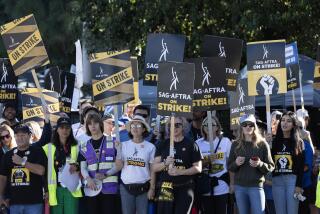Progress made in NHL talks
- Share via
Seven hours of meetings between representatives of the NHL and the NHL Players’ Assn. on Tuesday in New York produced at least one key agreement: that they had enough reason to reconvene Wednesday to continue exploring resolutions to the labor dispute that has wiped out more than a quarter of the schedule.
People familiar with the nature of the talks but not authorized to speak publicly said progress had been made, but both sides declined to describe specifics of the sessions, which were attended by top executives of both sides as well as 13 players and several owners.
NHL Deputy Commissioner Bill Daly confirmed that collective bargaining talks had ended at 7:15 p.m. Pacific time and would resume Wednesday. He added, “The league will not characterize the essence or the detail of the discussions until their conclusion.” A spokesman for the NHLPA said the sides will meet again Wednesday at an undisclosed time.
The NHL has canceled games through Nov. 30 and the Jan. 1 Winter Classic, but there’s enough time for each team to play a schedule of about 60 games if an accord is reached in the next two weeks.
Tuesday’s meeting was the first large-scale negotiating session since Oct. 18. Daly and Steve Fehr, the NHLPA’s special counsel, had met Saturday and laid the groundwork for Tuesday’s session.
After weeks of media manipulation and each side criticizing the other for being unwilling to negotiate, their reticence Tuesday seemed a sign they’re serious about negotiating a new labor deal.
The mechanism to reduce players’ share of hockey-related revenue from last season’s 57% to 50% has been the center of contention. Players are unwilling to pay heavily into an escrow fund without guarantee they’ll get the full value of their contracts, and the NHL is believed to have bent on that point. But the league still wants contracts limited to a maximum of five years and wants to delay unrestricted free agency until players are 28 or have eight years’ accrued service, points the players oppose.
The sides have also dealt with player-safety issues and a league proposal that would no longer allow teams to avoid salary-cap problems by burying high-salaried players in the minor leagues.
helene.elliott@latimes.com
twitter.com/helenenothelen
More to Read
Go beyond the scoreboard
Get the latest on L.A.'s teams in the daily Sports Report newsletter.
You may occasionally receive promotional content from the Los Angeles Times.











